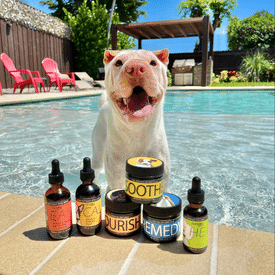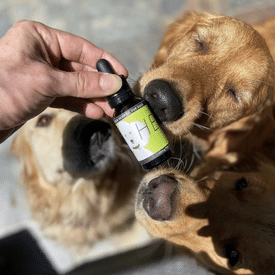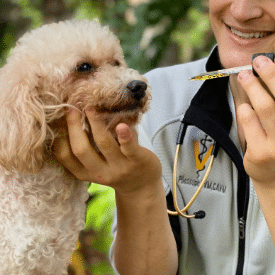Is THC Safe For Pets?

In a word, yes. THC from cannabis is being used across therapeutic modalities at an ever increasing rate, and for good reason. With a long list of positive and effective healing properties, it is no wonder this compound is gaining more and more attention. As with any powerful treatment, we have to approach THC with an awareness of the effects that come with its promising abilities.
Table of Contents
What is THC?
Scientists have discovered over 114 unique components called cannabinoids in the cannabis plant. The two most prevalent are CBD and THC.
CBD gets a lot of air time because its powerful healing properties have no associated symptoms of impairment. As for THC, conversations about its potential as a medicine have not been taken up with nearly as much enthusiasm. Despite numerous studies showing its safety and potential in treating cancer and other chronic diseases, the public is still wary of THC because of the associated ‘high’.
THC in Hemp
According to current federal regulations, hemp extract must contain less than .3% THC. This is not enough to get a dog stoned except at super high doses.
Currently, all CBD Dog Health products are hemp products and therefore have less than .3% THC.
THC in Marijuana
In some cases, dogs and cats may benefit from cannabis preparations with higher levels of THC. Products containing more than .3% THC are classified as Marijuana.
Reports of animals treated with higher doses of THC show that with gradual THC increase over time, our pets are able to successfully tolerate the psychoactive effects.

What are the benefits of THC?
The benefits of THC can not be overstated. It is an essential part of the plant with its own unique healing properties and a strong synergistic relationship to the other cannabinoids.
The entourage effect is a term that describes the complex balance of all the different elements of the cannabis plant. They all work together to amplify each other’s effects and create a multi-target therapy capable of healing many different ailments at once.
Some of the known therapeutic properties of THC include:
- Analgesic (pain management)
- Anti-cancer
- Anti-nausea
- Sedative
- Neuroprotective
- Reduction of intraocular pressure
- Bronchodilator
- Promotes sleep
- Gastrointestinal support
- Appetite stimulant \
THC Toxicity
THC Toxicity is a phrase that gets thrown around a lot. This is one of the first things that comes up with any google search about cannabis for pets. Reports of pets getting into their owner’s edibles often prompt headlines that claim ‘THC overdose’ and can make it look like normal therapeutic use of THC runs the risk of injury or death. This accidental dosing is not the same as intentional therapeutic use.
What do they really mean when they say THC is toxic?
The word toxicity conjures fears of poisonous chemicals, contaminants, and dangerous side effects. To most people, toxicity means, ‘may cause death’, when in reality, the effects of THC in our pets are overwhelmingly beneficial and safe despite the ‘intoxicating’ effects.
In addition, there is clinical research that provides evidence as to the safety of cannabis and THC, even at extremely high doses.
One of the clearest examples proving THC’s relative safety in comparison to other common medications is from a study from The Mason Research Institute.
In this clinical study, scientists set out on a mission to find the lethal dose of THC in rats, dogs, and chimpanzees. They experimented using 3000 mg/kg, up to 9000 mg per single dose. This sounds like a lot of THC, and it is. The only way to get this amount of THC into an animal was via super concentrated intravenous injections.
Not only is this a cruel experiment to do on any living creature, but it is also completely out of proportion with what our pets would come into contact with intentionally, or even accidentally in real life.
To give you some context, one dose of our Heal tincture contains approximately 0.9 mg of THC. That means they were experimenting with a dosage 10,000 times higher than what we recommend for our more serious cases. Can you imagine what would happen if you took 10,000 times the recommended dose of your medications? It would be miraculous if there were no adverse effects, nevermind a chance for survival.
Despite those odds, this study reported no instances of death in their canine test subjects even at those astronomical doses, proving that THC is incredibly safe, despite the somewhat concerning appearance of its psychoactive effects on animals.
Is there such a thing as too much THC?
Of course! More is not necessarily better. As with any medication our goal is to find the right dose, not the highest dose possible. Dogs have way more receptors for cannabinoids than humans, which means they are super sensitive to all its effects, including the psychoactive ones. This can be extremely uncomfortable and even traumatic for a dog.
In addition, dogs exhibit different responses to THC than humans.
Here are some of the visible effects of high doses of THC in dogs:
- Urinary incontinence
- Cooler body temperature
- Excessive salivation
- Changes in heart rate
And most commonly …
5. Static Ataxia.
Static Ataxia
Static ataxia is a term used to describe the physical state dogs get into when they have a lot of THC. Regardless of how serious it sounds by name, static ataxia is not particularly dangerous.
Unlike humans, dogs who ingest THC can show a dramatic loss of coordination, balance, and motor function. They tend to stagger as they walk, sway while standing and keep a wide gate and rigid stance. Reports tend to describe them as looking drunk or woozy.
Typically we don’t see these kinds of effects with animals who are treated with a hemp extract except at super high doses. It has also occurred in the past with very old dogs the first time they received a dose.
Dogs that are treated with a product containing more THC may be more prone to static ataxia and other side effects, but usually those effects are dampened over time and can be avoided by starting on a low dose and working up to your desired treatment.
What do Veterinarians say about THC?
Most conventional, western style veterinary colleges teach very little about whole plant medicine, nevermind cannabis and the endocannabinoid system. It is because of this, as well as stringent laws regarding their ability to advise on cannabis for pets, that many vets refuse to recommend or even discuss cannabis for pets.
Lack of Information
Typically, veterinarians will say that they don’t have enough information from clinical trials to discuss or recommend, but that is changing quickly. Since 2018, there have been significant advances in clinical research by reputable scientific institutions around the world. There is still so much to be done, but these studies corroborate the overwhelming anecdotal evidence that has accumulated for decades.
Here’s a great double-blind, peer-reviewed study from February 2020 that looks at the effects of products containing different ratios of CBD to THC on dogs.
Because of the mounting evidence as well as pressure from the public, veterinarians are growing more open-minded and comfortable with cannabis as an alternative therapy.
At present, veterinarians who know a good deal about cannabis medicine have actively gone out and learned in their own private time. In time, training in cannabis medicine will become a necessary part of their training.
Why are Vets Scared?
When we raised our concerns over the safety of cannabis and THC to Dr. Gary Richter MS, DVM, CVA, CVC, a leading voice in cannabis medicine for pets, his response mirrored our experience.
“Life-threatening risks for dogs from medical cannabis are exceedingly rare,” Richter says. “Toxicity more often occurs when a pet has eaten a product that contains chocolate, coffee, or raisins. Even if the THC toxicity is not excessive, they can sometimes have problems due to these other ingredients.”
When veterinarians’ main experience with cannabis is dogs who have been unintentionally exposed to cannabis and consumed human doses of THC along with other truly harmful substances, it is no surprise they are hesitant to recommend it as treatment.
What about vets who do embrace THC, CBD and Cannabis?
Another veterinarian who has actual experience working with cannabis medicine is Dr. Trina Hazzah, DVM, DACVIM, CVCH. Dr. Hazzah has been practicing with Chinese herbal medicine and cannabis medicine for years, while working as an oncologist at the busy Los Angeles VCA Animal Hospital. I spoke to her about how she uses cannabis in personalized treatment for animals suffering from different cancers.
She advocates openly for the importance of a healthy diet and the use of cannabis as an alternative to damaging and invasive cancer therapies, typical to western veterinary medicine.
“I always say to people, what’s the worst that can happen — they stare at the wall for a while if they get too much?” says Dr. Hazzah. “But, what’s the worst that my chemo can do? Much worse than that. And you can use cannabis to help balance the side effects of chemotherapy and other western treatment.”
Again, to clarify CBD Dog Health does not sell any products which contain enough THC to cause a high in animals. This doctor is working with cases where she is treating patients with up to 100 mg of THC in a dose and doing it completely safe.
Some final tips to make sure you’re safe:
- Ensure you are using a high-quality product.
- When dosing with higher levels of THC, start low, and slowly increase the dose.
- Monitor your pet closely and keep a journal to record the effects.
- Consult with an expert or veterinarian.
The Takeaway
Cannabis medicine is complicated. We are still in the beginning stages of researching everything it can do and how it works. In the coming years we can expect to see the secrets of cannabis medicine unlocked with even greater specificity. For now, we can rest assured that this stuff works and is very safe.
For most ailments, the .3% THC found in a full-spectrum extract, like the one we use at CBD Dog Health, is all a dog or cat needs. It is not enough to cause any psychoactive side effects and is perfectly safe.
It is possible for pets to be exposed to too much THC. Usually this happens accidentally when pets get into something they shouldn’t have. This is risky business for older pets who may react badly to the intense stress caused by the psychoactive effects of THC.
If you suspect your pet may benefit from higher levels of THC and you live in one of the states where marijuana products are currently legal, that is a great option! Work with a medical cannabis professional to design a safe and effective dosing regimen that will heal your pet naturally!
#HealingNaturally















